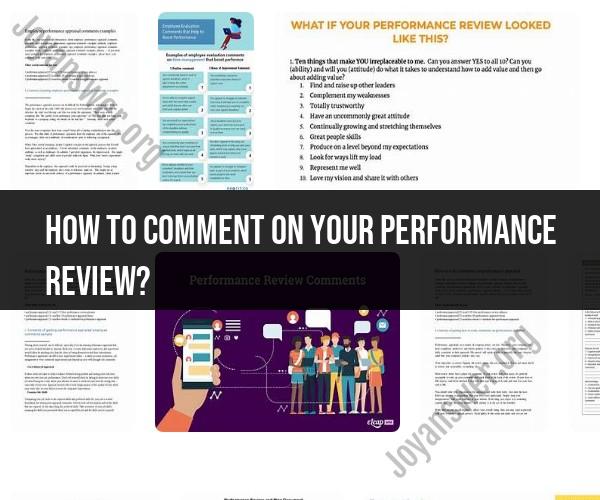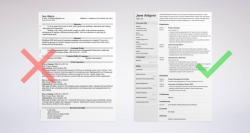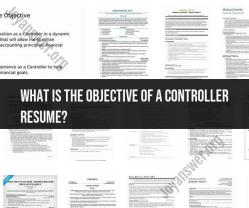How to comment on your performance review?
Providing comments on your performance review, also known as a self-assessment or self-appraisal, is an important part of the performance review process. Here are some tips on how to effectively comment on your performance review:
Read Your Review Thoroughly: Before you provide comments, carefully read and review the feedback and ratings given by your supervisor. Take notes on areas where you agree or disagree and where you have specific examples or evidence to support your comments.
Acknowledge Positive Feedback: Start by acknowledging and thanking your supervisor for any positive feedback or praise mentioned in the review. Express appreciation for the recognition of your achievements and contributions.
Address Constructive Feedback: If there are areas where your performance needs improvement or where your supervisor has provided constructive criticism, address these points directly. Be open to feedback and avoid becoming defensive.
Provide Evidence and Examples: Support your comments with specific examples and evidence from your work. This could include accomplishments, projects you've completed, or instances where you've demonstrated specific skills or behaviors.
Highlight Achievements: Emphasize your achievements and contributions to the organization. Share success stories and results that showcase your skills and impact on the team or company.
Discuss Goals and Development: Share your professional goals and how you plan to further develop your skills and expertise. Discuss any training, courses, or certifications you're pursuing to improve your performance.
Address Challenges: If you faced challenges during the review period that may have affected your performance, mention them and explain how you worked to overcome them. Show resilience and a proactive attitude.
Set Clear Objectives: Outline your goals and objectives for the upcoming year or review period. Clarify how you plan to address any areas for improvement and how you intend to contribute to the organization's success.
Stay Professional and Positive: Maintain a professional and positive tone in your comments. Avoid blaming others or making excuses. Focus on your own actions and responsibilities.
Seek Clarification (if needed): If you have questions or need clarification on any points in the review, don't hesitate to ask your supervisor for further explanation or feedback.
Proofread Your Comments: Take the time to proofread and edit your comments for clarity and correctness. Well-written comments demonstrate attention to detail and professionalism.
Submit on Time: Ensure that you submit your self-assessment within the designated timeframe set by your organization. Late submissions can reflect poorly on your commitment to the review process.
Request a Meeting (if desired): If you feel that a face-to-face meeting with your supervisor to discuss your comments would be beneficial, request one. This can provide an opportunity for a more in-depth conversation.
Remember that the purpose of your comments is to provide a balanced and constructive perspective on your performance. It's an opportunity to showcase your accomplishments, demonstrate your commitment to growth, and engage in a productive dialogue with your supervisor about your professional development.
Keep in mind that your comments should align with the organization's goals and values and show your dedication to contributing to its success.
Providing Feedback on Your Performance Review: Dos and Don'ts
Dos:
- Be specific and provide examples. Don't just say that you agree or disagree with your manager's assessment. Explain why you agree or disagree and provide specific examples to support your claims.
- Be constructive. Your feedback should be focused on helping your manager to better understand your strengths and weaknesses, and to identify areas where you can improve.
- Be professional. Avoid making personal attacks or being critical of your manager's leadership style.
Don'ts:
- Don't be afraid to disagree. If you disagree with your manager's assessment, it's important to speak up. However, be respectful and professional in your disagreement.
- Don't be negative. Focus on providing constructive feedback that will help you to improve. Avoid dwelling on your mistakes or complaining about your job.
- Don't be defensive. If your manager gives you negative feedback, don't take it personally. Instead, try to see it as an opportunity to learn and grow.
A Guide to Constructive Self-Assessment: Commenting on Your Review
When commenting on your performance review, it's important to be honest and self-aware. Identify your strengths and weaknesses, and set goals for improvement. Here are a few tips:
- Be specific and provide examples. When identifying your strengths and weaknesses, be specific and provide examples to support your claims. For example, instead of saying that you're a good communicator, say that you're able to clearly and concisely explain complex concepts to both technical and non-technical audiences.
- Be realistic. Don't set unrealistic goals for yourself. Instead, focus on setting goals that are achievable and measurable.
- Be positive. Your comments on your performance review should be positive and focused on your desire to improve. Avoid dwelling on your mistakes or complaining about your job.
Contributing to Your Evaluation: Writing Comments for Your Performance Review
When writing comments for your performance review, it's important to be clear and concise. Focus on your key accomplishments and areas where you can improve. Here are a few tips:
- Start by thanking your manager for their feedback.
- Highlight your key accomplishments. What are your proudest achievements from the past year? Be specific and provide examples.
- Identify areas where you can improve. No one is perfect. Everyone has areas where they can improve. Be honest about your weaknesses and set goals for improvement.
- Thank your manager again for their support.
Here is an example of a comment for a performance review:
I am grateful for the opportunity to review my performance with you today. I am proud of my accomplishments over the past year, including successfully launching the new product line and exceeding my sales goals by 15%. I am also committed to improving my communication skills, and I plan to take a public speaking class this year.
By following these tips, you can provide constructive feedback on your performance review and contribute to your evaluation in a positive and meaningful way.












